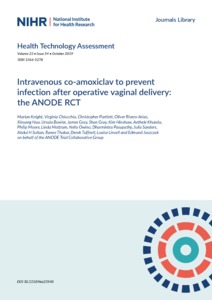Knight, M;
Chiocchia, V;
Partlett, C;
Rivero-Arias, O;
Hua, X;
Bowler, U;
Gray, J;
Gray, S;
Hinshaw, K;
Khunda, A;
et al.
Knight, M; Chiocchia, V; Partlett, C; Rivero-Arias, O; Hua, X; Bowler, U; Gray, J; Gray, S; Hinshaw, K; Khunda, A; Moore, P; Mottram, L; Owino, N; Pasupathy, D; Sanders, J; Sultan, AH; Thakar, R; Tuffnell, D; Linsell, L; Juszczak, E
(2019)
Intravenous co-amoxiclav to prevent infection after operative vaginal delivery: the ANODE RCT.
Health Technol Assess, 23 (54).
pp. 1-54.
ISSN 2046-4924
https://doi.org/10.3310/hta23540
SGUL Authors: Sultan, Abdul Hameed
![[img]](https://openaccess.sgul.ac.uk/111445/1.hassmallThumbnailVersion/3030717.pdf)  Preview |
|
PDF
Published Version
Available under License ["licenses_description_publisher" not defined].
Download (664kB)
| Preview
|
Abstract
BACKGROUND: Sepsis is a leading cause of direct and indirect maternal death in both the UK and globally. All forms of operative delivery are associated with an increased risk of sepsis, and the National Institute for Health and Care Excellence's guidance recommends the use of prophylactic antibiotics at all caesarean deliveries, based on substantial randomised controlled trial evidence of clinical effectiveness. A Cochrane review, updated in 2017 (Liabsuetrakul T, Choobun T, Peeyananjarassri K, Islam QM. Antibiotic prophylaxis for operative vaginal delivery. Cochrane Database Syst Rev 2017;8:CD004455), identified only one small previous trial of prophylactic antibiotics following operative vaginal birth (forceps or ventouse/vacuum extraction) and, given the small study size and extreme result, suggested that further robust evidence is needed. OBJECTIVES: To investigate whether or not a single dose of prophylactic antibiotic following operative vaginal birth is clinically effective for preventing confirmed or presumed maternal infection, and to investigate the associated impact on health-care costs. DESIGN: A multicentre, randomised, blinded, placebo-controlled trial. SETTING: Twenty-seven maternity units in the UK. PARTICIPANTS: Women who had an operative vaginal birth at ≥ 36 weeks' gestation, who were not known to be allergic to penicillin or constituents of co-amoxiclav and who had no indication for ongoing antibiotics. INTERVENTIONS: A single dose of intravenous co-amoxiclav (1 g of amoxicillin/200 mg of clavulanic acid) or placebo (sterile saline) allocated through sealed, sequentially numbered, indistinguishable packs. MAIN OUTCOME MEASURES: Primary outcome - confirmed or suspected infection within 6 weeks of giving birth. Secondary outcomes - severe sepsis, perineal wound infection, perineal pain, use of pain relief, hospital bed stay, hospital/general practitioner visits, need for additional perineal care, dyspareunia, ability to sit comfortably to feed the baby, maternal general health, breastfeeding, wound breakdown, occurrence of anaphylaxis and health-care costs. RESULTS: Between March 2016 and June 2018, 3427 women were randomised: 1719 to the antibiotic arm and 1708 to the placebo arm. Seven women withdrew, leaving 1715 women in the antibiotic arm and 1705 in the placebo arm for analysis. Primary outcome data were available for 3225 out of 3420 women (94.3%). Women randomised to the antibiotic arm were significantly less likely to have confirmed or suspected infection within 6 weeks of giving birth (180/1619, 11%) than women randomised to the placebo arm (306/1606, 19%) (relative risk 0.58, 95% confidence interval 0.49 to 0.69). Three serious adverse events were reported: one in the placebo arm and two in the antibiotic arm (one was thought to be causally related to the intervention). LIMITATIONS: The follow-up rate achieved for most secondary outcomes was 76%. CONCLUSIONS: This trial has shown clear evidence of benefit of a single intravenous dose of prophylactic co-amoxiclav after operative vaginal birth. These results may lead to reconsideration of official policy/guidance. Further analysis of the mechanism of action of this single dose of antibiotic is needed to investigate whether earlier, pre-delivery or repeated administration could be more effective. Until these analyses are completed, there is no indication for administration of more than a single dose of prophylactic antibiotic, or for pre-delivery administration. TRIAL REGISTRATION: Current Controlled Trials ISRCTN11166984. FUNDING: This project was funded by the National Institute for Health Research Health Technology Assessment programme and will be published in full in Health Technology Assessment; Vol. 23, No. 54. See the National Institute for Health Research Journals Library website for further project information.
| Item Type: |
Article
|
| Additional Information: |
© Queen’s Printer and Controller of HMSO 2019. This work was produced by Knight et al. under the terms of a commissioning contract issued by the Secretary of State for Health and Social Care. This issue may be freely reproduced for the purposes of private research and study and extracts (or indeed, the full report) may be included in professional journals provided that suitable acknowledgement is made and the reproduction is not associated with any form of advertising. Applications for commercial reproduction should be addressed to: NIHR Journals Library, National Institute for Health Research, Evaluation, Trials and Studies Coordinating Centre, Alpha House, University of Southampton Science Park, Southampton SO16 7NS, UK. |
| Keywords: |
INFECTION, OPERATIVE VAGINAL DELIVERY, PROPHYLAXIS, RANDOMISED CONTROLLED TRIAL, 1117 Public Health And Health Services, 0807 Library And Information Studies, 0806 Information Systems, Health Policy & Services |
| SGUL Research Institute / Research Centre: |
Academic Structure > Institute of Medical, Biomedical and Allied Health Education (IMBE) |
| Journal or Publication Title: |
Health Technol Assess |
| ISSN: |
2046-4924 |
| Language: |
eng |
| Publisher License: |
Publisher's own licence |
| Projects: |
|
| PubMed ID: |
31590702 |
| Web of Science ID: |
WOS:000489342500001 |
| Dates: |
| Date |
Event |
| 2019-10 |
Published |
|
 |
Go to PubMed abstract |
| URI: |
https://openaccess.sgul.ac.uk/id/eprint/111445 |
| Publisher's version: |
https://doi.org/10.3310/hta23540 |
Statistics
Item downloaded times since 02 Dec 2019.
Actions (login required)
 |
Edit Item |



